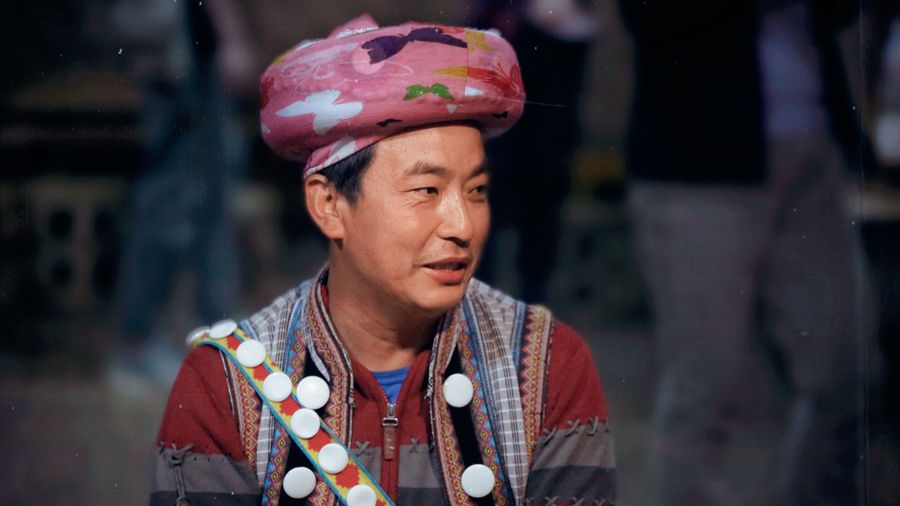T UCKED in a remote hamlet called Laomudeng in southwest China’s Yunnan Province, Yu Wulin’s guesthouse looks tidy, cozy, and sometimes exotic given its bamboo-made roofs and floors.
In the Nu dialect, Laomudeng means “the place people love to go.” The hillside village, surrounded by tall mountains and green fields, is best known for its perfect location to take in the view of the Nujiang Grand Canyon.
However, the 43-year-old Yu had never dreamed of being an innkeeper when he was a child. He grew up as a farmer like most of his neighbors in the long impoverished region.
Prime Real Estate
Yu’s family was quite poor when he was a boy. Being the fifth and the youngest child in the Nu ethnic family in one of China’s poorest areas, he grew up with little food and clothing, and even had no shoes of his own.

Looking out from some rooms of Yu Wulin’s inn, guests can see rolling, mist-shrouded hills and ravines. He Shan
What they did have was an extraordinarily picturesque view from their windows: A steep valley and a winding river – the famous Nujiang River. The place remains primitive and intact, removed from the world’s hustle and bustle. The only sign of contact with the outside world was a church built by French missionaries more than 100 years ago.
Yu’s home sits nearest to the church, and in the 1990s, he began noticing backpackers who trekked along the muddy roads to reach the remote village. Many of them asked his family for lodging and dining, and paid cash in gratitude when they left.
Still, Yu had yet to consider it as a money-making opportunity.
“We were just curious and wondered why they had nothing to do but backpacking in such a remote village,” he said.
Yu dropped out of high school in 1996 and went to Shanghai as an ethnic singer. That was the first time he went outside of the village. Seeing the metropolis was certainly a novelty to Yu, but homesickness grew day by day until he decided to go back to Laomudeng at the end of 1997.
He married a girl of the Dulong ethnicity whom he met in Shanghai, a co-worker from the performance troupe. After returning home, they toiled on the farm, but found that they could barely make ends meet.
He said, “At that time we lived in a bamboo house. With little financial resources, we could buy new clothes for kids only once a year, and could hardly afford to travel to the nearest town.”
A Helping Hand
Things began to change in 2000. The local government granted aid to local residents in order to promote tourism. The couple was the first in the village to run a guesthouse.
“The experience of working in Shanghai had broadened my horizon and given me opportunities of making friends,” Yu said.

Yu Wulin being interviewed in his guesthouse on April 20, 2019. Fang Xiaoqi
Some of those friends helped him manage the digital end of his business. Yu also became fluent in Mandarin, a precious skill in his ethnically diverse hometown where most people communicate in the local dialects.
Meanwhile, Yu’s hometown was also getting a helping hand. Nujiang has been one of China’s poorest western areas, and the central government has targeted the area for development.
The government helped local residents build houses, pave roads, and gave them access to running water at home.
Yu said, “My success of running guesthouses is largely attributed to the favorable policies and support from the government.”
As more and more tourists came to visit the village, he expanded his inn with more rooms in 2012. To help him carry out the expansion, the local tourism bureau granted him RMB 50,000 (US $7,430) of subsidies, and the county government gave him 10 tons of cement.
When his 11-room inn couldn’t accommodate more customers, Yu opened his second inn in 2017, with a low-interest bank loan of RMB 2,700,000.
The inn was more modern, complete with clean toilets, Wi-Fi, and a communal area to allow different groups of guests to eat together and sit around an indoor fire pit.
As an enthusiastic music lover, he often shows guests the traditional Nu ethnic dance and instruments, together with local folk performers, bringing them a taste of his culture.
The upgrades allowed Yu to charge a premium rate – RMB 260 a room, compared to RMB 20 a bed at the beginning. His annual income has since risen to RMB 400,000, a small fortune in the area.
Setting an Example
Yu’s establishments employ dozens of local villagers, including some of his relatives. He pays them monthly salaries of about RMB 2,000-2,600.
His success also inspired others to follow his example. Eighteen households in the village have since opened guesthouses, and the once shanty-filled village has built many brightly painted houses furnished with sofas and TVs.
“Yu is always ready to help others whenever his peer villagers run into difficulties in operating a guesthouse,” said Bian Jianwen, a Fugong County official. “They also meet from time to time to discuss business and things they can work together on.”
Local schools provide free tuition during the 14-year compulsory education scheme. Yu’s two sons are majoring in hotel management at a secondary vocational school in the capital city of Yunnan.
“I hope they will come back after graduation and help to run my guesthouses,” he said.
HE SHAN is a reporter with china.org.cn.

